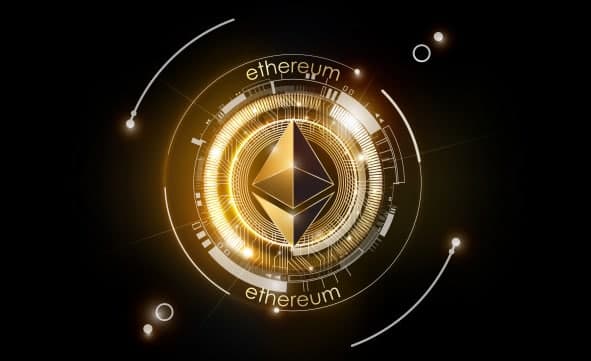After Bitcoin’s success, blockchain technology was growing enormously. Developers found that Bitcoin‘s benefit was very narrow and limited to only one purpose(money). Bitcoin has failed to impact the tech and financial services, because of the limited functionalities.
In order to overcome these limitations, developers thought of creating a blockchain-based platform with lots of benefits. That is the reason Ethereum was created. Ethereum is currently in second place on the Market.
What is Ethereum?
Ethereum is generally a decentralized system, open-source, and distributed computing platform which enables the creation of smart contracts and decentralized applications (DApps). It is the second-largest crypto platform by market capitalization.
Ethereum has a native cryptocurrency named Ether (ETH). Globally, people use ETH to make payments. More than thousands of developers all around the world use Ethereum to build applications.
Who Invented Ethereum?
Ethereum was founded by 19 years old Vitalik Buterin Russian-Canadian and the core team of Ethereum consists of Vitalik Buterin, Mihai Alisie, Anthony Di Iorio, Charles Hoskinson, Joe Lubin, and Gavin Wood.
How Ethereum began?
Vitalik Buterin described his concept on a whitepaper in the year 2013 and shared it with his friends. He was discussing the concept with around 30 people and expecting critical reviews and people pointing out the mistakes, but surprisingly that didn’t happen.
Vitalik Buterin, Mihai Alisie, Anthony Di Iorio, Charles Hoskinson, Joe Lubin, and Gavin Wood are the core team members of Ethereum. In the year 2014, the concept was publicly announced.
Key Highlights
- November 2013: Ethereum whitepaper was published by Vitalik Buterin.
- January 2014: Publicly announced the development of the Ethereum platform.
- August 2014: Ethereum closes its ICO and raises $18.4 million.
- May 2015: “Olympic” the ethereum test net releases.
- July 30, 2015: “Frontier”, the first stage of Ethereum’s development was released.
- March 14, 2016: Homestead the first “stable” Ethereum release, went out on square 1,150,000.
- June 2016: The DAO hack happens and the $50 million worth of Ether, which was 15% of the total Ether in circulation back at the time.
- October 25, 2016: From the original Ethereum protocol Ethereum Classic forks away.
- October 16, 2017: Update of the Metropolis Byzantium hardfork happens.
- February 28, 2019: The Metropolis Constantinople hardfork update happens.
How Ethereum Works?
Ethereum is similar to bitcoin and its blockchain design but it also supports applications beyond the money system. Generally, Ethereum is the transaction-based state machine. It consists of millions of transactions in every state.
These transactions are grouped to form ‘blocks’, all the blocks are chained up with the previous blocks. Transactions need to be validated before it is added on to the ledger, which then goes through the process called mining.
Ethereum Mining
Miners generally play the key role of any crypto network as they spend their time and computational power in solving the math problem which is called the ‘proof of work’ for the network, that verifies the Ether transaction. They are also responsible for creating new Ether tokens, as they receive rewards through this process.
More time and computational powers are required as more miners join in. As the Ether value is surging up, the rewards received by miners are still quite worth.
How to store Ethereum?
Ethereum stored on a cryptocurrency wallet. That will be the place where you can receive Ether and also send your Ether from. There are generally several types of secured Ethereum wallets. They are paper wallets, hardware wallets, desktop wallets, and hot wallets.
The paper wallet is the most secure wallet for storing Ethereum. In this wallet, the private keys are written on the piece of paper and locked away in a safe and secured deposit box. Ethereum hardware wallets are simply the hardware devices, where users can save private keys, this wallet also a safe wallet, they cannot be hacked, because the wallet can’t be accessed through the internet. Desktop wallets are also secured wallets, but this depends on the proper security of our own computer.
How much is Ethereum worth?
The total value of all the Ethereum in the world was $111.9 Billion as of June 25, 2020.
| Ticker | ETH |
| Current Price | $456 |
| Market Cap | $51,762,453,750 |
| 24-hour Volume | $10,523,992,906 |
| Circulating Supply | 113,436,947 |
List of some Ethereum Apps
Below are some of the apps running on the Ethereum network:
- Coakt: Coakt is a crowdfunding platform that allows users to raise not only the cash but also the talents and the technology.
- EthLance: EthLance is a platform for the job market, it connects freelancers and developers with the employees, to engage in jobs and transfer payments in Ether.
- Raiden Network: Raiden network works as a high-speed asset transfer for Ethereum. It is scalable, reliable, and provides low transaction fees.
- TenX: TenX provides the ability to spend Ether in the world by the users. Physical visa and master cards can sold through TenX.
- Gnosis: Gnosis has its own token. It generally allows users to predict election results, weather, etc.
- Etheria: Etheria is a decentralized Minecraft, the entire world state is stored in the Ethereum blockchain. Each tile is for sale in the virtual world and costs a full Ether, once purchased the owner can send commands through smart contract protocol.
- EtherTweet: Ether tweet generally takes its function from Twitter, this is a totally uncensored Blockchain-based communication platform.
What is Ethereum Gas?
Ethereum Gas is generally a unit that is used to measure the computational effort that it will take to execute a certain operation. Operations like the transaction or smart contract execution or ICO which takes part in Ethereum requires some amount of gas.
Gas calculates the number of fees that are required to pay the network in order to execute an operation. Miners get paid an amount in Ether that is equal to the total amount of gas it took them to execute a complete operation.
How does Ethereum differ from bitcoin?
Bitcoin is the stable and most successful crypto to date, whereas Ethereum is generally a project with multipurpose, its digital currency Ether is just a component of smart contract applications. Bitcoin has a hard cap of 21 M bitcoins, whereas the potential supply of Ethereum is generally endless.
BTC takes 10 minutes for average block mining, whereas Ethereum takes only 12 seconds. Bitcoin requires more computing power and electricity whereas Ethereum’s proof-of-work algorithm allows decentralized mining.
Ethereum Exchanges
Users should get familiar with different exchange types before they choose the exchange. The following are some of the types of exchanges available.
-
Trading platforms:
Trading platforms are generally the cheapest option for fees but more complicated than other options. This platform directly connects the buyer and seller through an online website. Some of the trading platforms are eToro, Bitstamp, Binance, etc.
-
Broker Exchanges:
These are the websites that sell Ethereum for a premium. Brokers are the easiest way to buy Ethereum and also costliest. The broker exchanges include CoinMama, CEX.io, Coinbase, etc.
-
P2P Exchanges:
These are the websites that connect buyers and sellers directly so that it will be easy for users to negotiate prices. These websites provide many options like payment methods, countries, etc. LocalCryptos is a P2P exchange where buyers and sellers can meet online and trade.
Benefits of Ethereum
- The decentralized apps and DAOs deployed within the network cannot controlled by any third party.
- Every change made within the system needs to be agreed the nodes within the system, in order to eliminate fraud, corruption, etc.
- Since Ethereum is a decentralized platform there is no single point of failure.
- Decentralized nature and cryptographic security make the network protect against hacking and fraudulent activities.
Recommended for You








